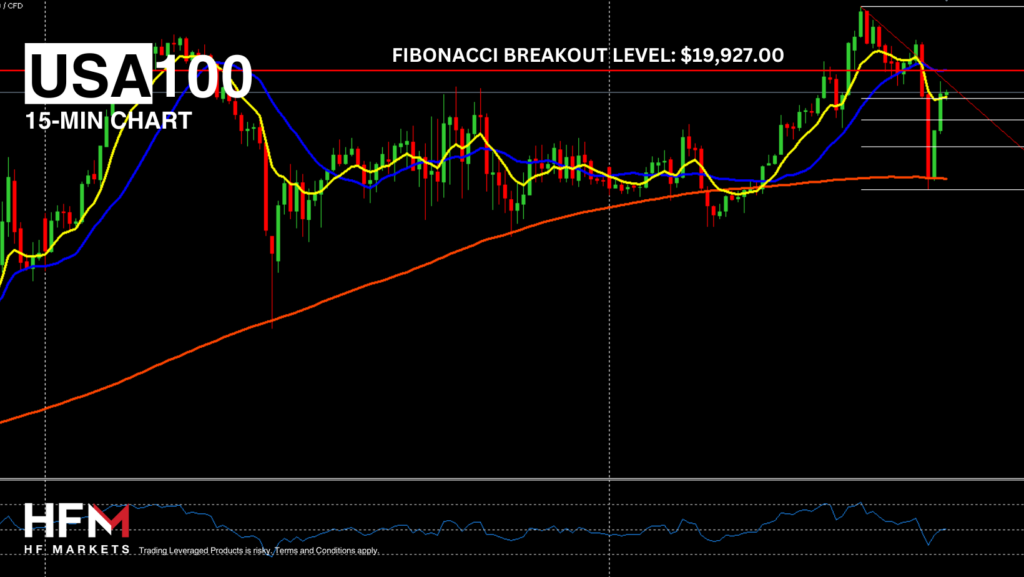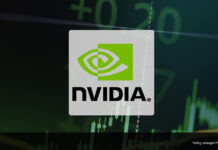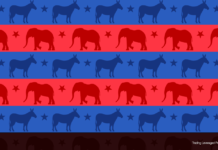- PMI reports indicate more interest rate cuts are imminent and consumer demand is likely to slow.
- Investors expect the ECB and the Federal Reserve to continue cutting interest rates.
- The NASDAQ increased after the index traded sideways on Monday. US investors await the release of the US CB Consumer Confidence Index.
- Chinese stimulus and dovish comments from the Federal Reserve continue to support stocks despite poor PMI data.
NASDAQ (USA100) – Dovish Fed Comments Keep The NASDAQ Alive!
The NASDAQ is forming a descending triangle which is known to be a bullish trend in the medium-term. However, economists advise that risks remain and there could be some risks arising. These risks include if the economy continues to release extremely poor economic data or if company earnings do not live up to expectations. The technology sector will start releasing their quarterly earnings report from the 16th October onwards. This is currently 3 weeks from now.
The instrument is gaining additional support from expectations of further monetary easing. Recently, Federal Reserve Governor Mr Waller advocated for a more aggressive reduction in borrowing costs if economic data continues to worsen. Otherwise, a more moderate 25-basis-point rate cut could be considered at the upcoming meeting.
Yesterday’s September business activity data indicated a slowdown in economic growth, with the Manufacturing PMI declining from 47.9 to 47.0 and the Services PMI dropping from 55.7 to 55.4. This reinforced market expectations for a 50-basis-point rate cut in November, with the CME FedWatch Tool now estimating a 50.2% probability.
Another positive factor is that the VIX continues to decline throughout the day. The VIX is currently 1.15% lower which is known to be positive for the stock market. In addition to this, European stocks also continue to increase in value indicating a stronger risk appetite. However, the only concern for the stock market when considering the domino effect, is the higher bond yields. Bond yields are rising for the fifth consecutive day. This morning, bond yields rose a further 0.047%. This is known to be negative for stocks and investors will aim for this to decline in order to support the stock market.
Currently, the NASDAQ is trading above its recent average price movement and above the VWAP. This is a good sign, however, the index is now trading at a previous resistance level from August 22nd. So the question is if investors’ psychology will change now the price is at a resistance level. If the price increases back above $19,927, the index would have seen enough momentum to trigger a bullish trend. However, if the price falls below $19,842.90 and $19,801.70, sell signals can strengthen.
Of the most influential individual stocks within the NASDAQ 100, only 50% are trading higher. This is now adequate enough to indicate that the bullish momentum will remain. Investors will monitor if this percentage rises above 65% once the US session opens. Ideally shareholders would also like to see the CB Consumer Confidence Index 103.9 or above.
Click here to access our Webinar Schedule
Michalis Efthymiou
Market Analyst
Disclaimer: This material is provided as a general marketing communication for information purposes only and does not constitute an independent investment research. Nothing in this communication contains, or should be considered as containing, an investment advice or an investment recommendation or a solicitation for the purpose of buying or selling of any financial instrument. All information provided is gathered from reputable sources and any information containing an indication of past performance is not a guarantee or reliable indicator of future performance. Users acknowledge that any investment in Leveraged Products is characterized by a certain degree of uncertainty and that any investment of this nature involves a high level of risk for which the users are solely responsible and liable. We assume no liability for any loss arising from any investment made based on the information provided in this communication. This communication must not be reproduced or further distributed without our prior written permission.




















